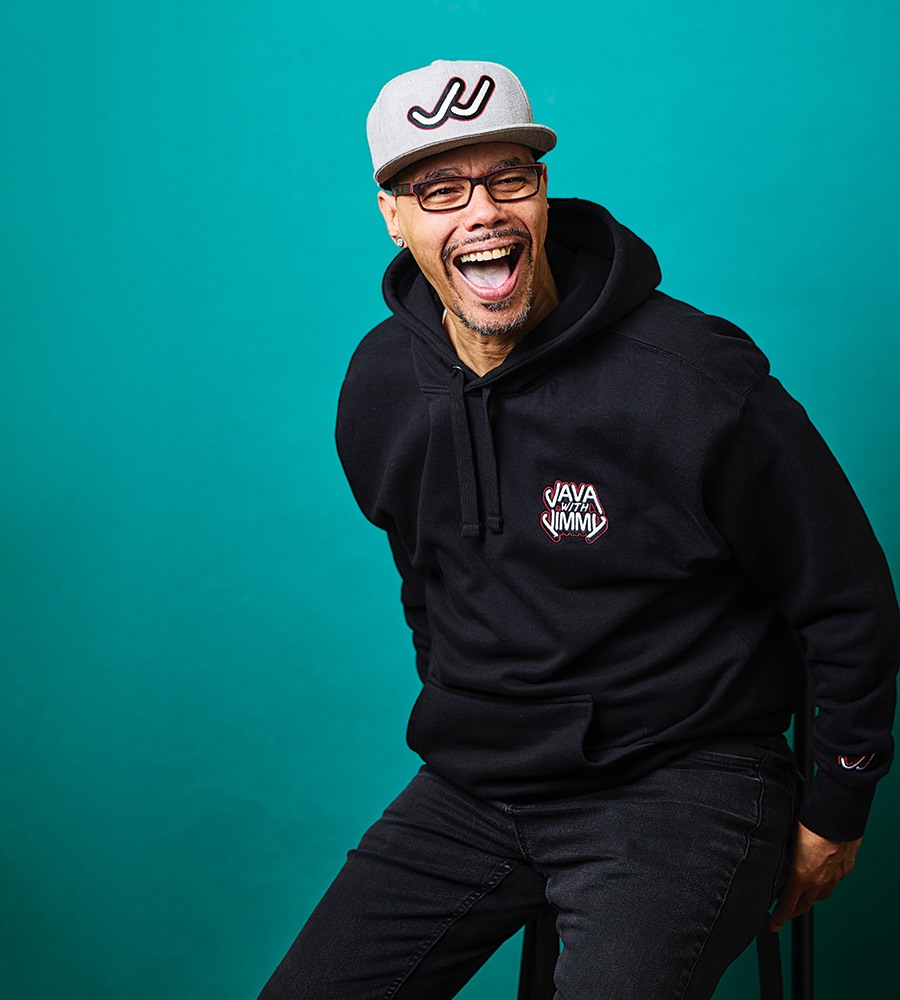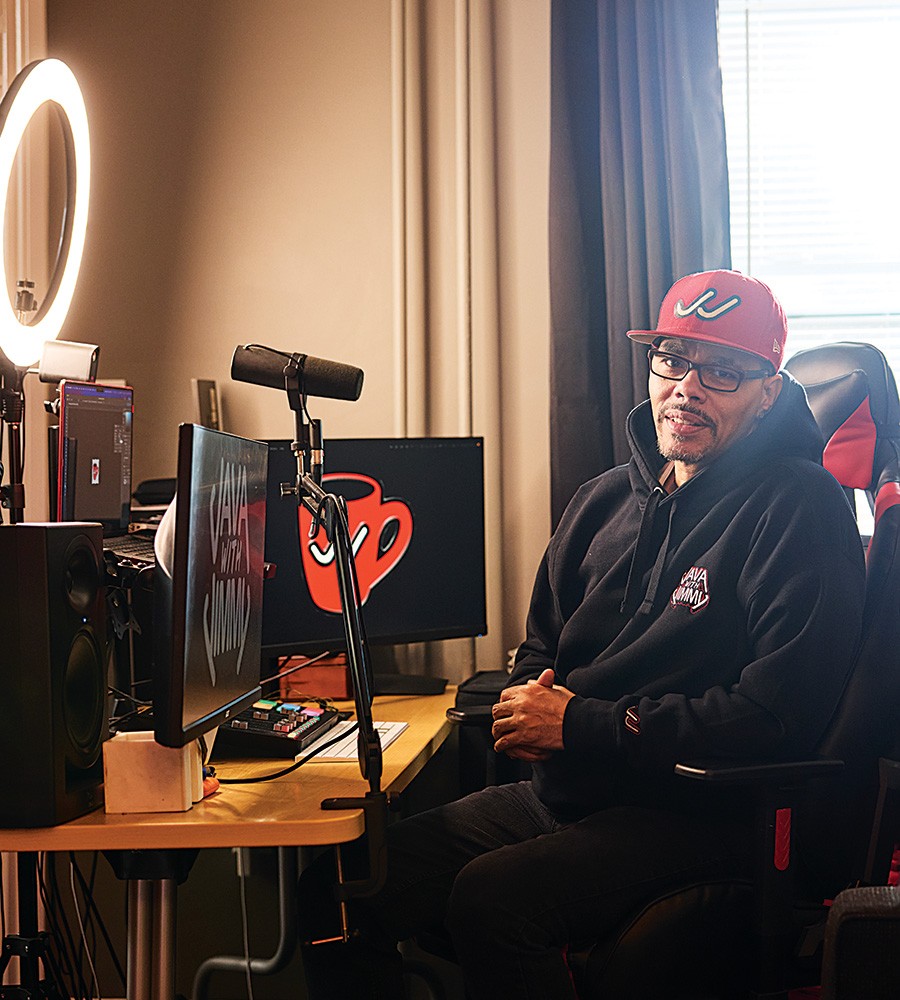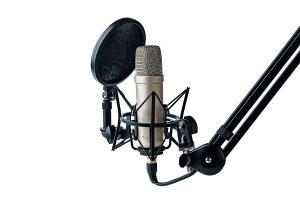“Java with Jimmy” Host Jimmy Hills on Success, Positivity, and Coffee
The activist who's become "something of an influencer" is fully caffeinated and ready to take on Boston, one interview at a time.

Portrait by Pat Piasecki
Longtime community activist James “Jimmy” Hills’s favorite color to wear on-air is red. “I’ve been around politics, and I know there’s a science to colors,” he says. “For me, at least, red symbolizes attention, alarm, and excitement.” Perhaps that’s why his 9 a.m. livestream, “Java with Jimmy,” which emerged as a response to the pandemic, continues to take Boston by storm. Addressing pressing issues beyond healthcare, including social justice and equity, Hills regularly attracts heavyweights and A-listers such as Governor Maura Healey and Mayor Michelle Wu, putting them at ease with his friendly tone and casual style. Fresh off Hills’s No. 63 placement on our 150 Most Influential Bostonians of 2024 list, we sat down with him to discuss the pitfalls of success, the power of positivity, and the difference between Starbucks and Dunkin’.
- Keith Lockhart Is Still Working on His “Death Face” After 30 Years
- Meet Trump’s New Federal Prosecutor in Blue Massachusetts
- They Tried to Silence Her COVID Origin Theory. Now Even the CIA Agrees with Alina Chan.
- Playwright Mfoniso Udofia Might Like to Get a Drink From the ‘Bubbler’
- The Exit Interview: Jill Medvedow, Outgoing ICA Boston Director
Did you ever think this thing was going to be such a huge hit?
No, to be very honest with you. We started during COVID-19, and at the time, we thought the pandemic would last two weeks, maybe two months. I really never thought it would propel me into spaces like [Boston magazine’s] 150 Most Influential Bostonians list.
“Java with Jimmy” was created specifically to address COVID’s impact on Black and brown communities. Are you still addressing those issues?
Yes, absolutely. COVID just exacerbated a lot of the health disparities and a lot of the inequities in the social determinants of health. Those are still very much present, but I will say that there’s more attention being paid, and there are also up-and-coming providers going into medical residencies and fellowships who are examining that. So I have to sprinkle some glimmer of hope in there.
What do you think is the most pressing issue on the social justice agenda these days?
Equity. In terms of economic and wealth development, and also criminal system reform, healthcare, et cetera. Equity is sort of a vague thing. It’s become almost a buzzword, sexy and trendy, unfortunately. But that doesn’t take away from the truth that we need to look at everything through the lens of equity and justice.
How would you describe your average listener?
Many of my listeners have experienced a lot of the inequalities we’re talking about. I’ve looked at the data. From a demographic standpoint, my largest group of listeners is women ages 35 to 54. But there are men who come into the room; there are gay men, trans people. There are academics, policymakers, industry leaders. It’s all walks of life. I have young people and college students, but the smallest demographic is 18 to 21. We have a listenership outside of Boston, too. I was with the Boston Athletic Association at the marathon. I put my hand out to a guy and said, “I’m Jimmy.” He said, “I know who you are. And I’m from Australia.”
Community, for me, is number one. And, of course, I would hope that people appreciate the information.
To what do you attribute your appeal?
The authenticity and the organic setting. I have to also say for people who come into the space—Ayanna Pressley, Michelle Wu, Maura Healey, and others—it’s also a space that is hospitable. I come from an activist background, and I had a bit of a social media following prior to this, but I used to be a little hotheaded, and there’s been an evolution. Community, for me, is number one. And, of course, I would hope that people appreciate the information. I know that I’m animated, so my personality, I think, is definitely a part of it as well.
You’ve referred to your livestream as the Java Café. What, exactly, is that?
It’s mobile. It’s pop-up-ish. And so, it’s really in my head. It started out in Dorchester, but I moved to Roxbury in October. And then, through a partnership with Beacon Capital Partners, I’ll have space over at Southline on Morrissey Boulevard in June. There’s actually going to be a podcast room. People will be able to come and watch, and we’ll have a little applause sign. I’ll run out and say, “Hey!” I used to joke around and say, “I want to be the Black Donahue,” so I’m getting the warm and fuzzies even talking about it. But that’s a goal. As I said, I didn’t set out for this to happen. But I’ve realized the impact, and I want to increase it and expand it and allow it to grow.
Any interest in transitioning to either TV or radio?
That’s a very interesting question. I’ve had exposure to radio as part of an Internet-based radio station and then most recently working with GBH in their studio. But mainstream legacy media and journalism is not a space where I believe I can function and continue to be my fully authentic self.

Portrait by Pat Piasecki
With respect to equipment, you started out using an iPhone. It was super low-tech, and now you’re using state-of-the-art equipment. Describe that transition.
Let’s be clear—I still need to upgrade to state-of-the-art, brother. But it has been an upgrade, and I have to say that was largely due to a combo of Embrace Boston, Reverend Willie Bodrick, Mayor Marty Walsh during COVID, and Reverend Jeffrey Brown. And I have to name Tina Chéry and the Peace Institute. They’ve been my fiscal conduit because I’m not a nonprofit, but I’m nonprofit adjacent. We have a memo of understanding that they can handle accepting donations for me. The Boston Resiliency Fund and the Boston Foundation gave me support to get some equipment, and I have to shout out to Massachusetts General Hospital, which helped me to upgrade my computer.
So it’s been a pretty grassroots, organic process?
It really has. You know, COVID was terrible, but we came together in different ways, and this was one of them. People saw the impact and wanted to support it.
Do you get recognized on the street or in the supermarket?
It used to happen. I used to work with Mayor Menino and I’d be in the media here and there, and once in a while people would be like, “Oh, I saw you on TV.” Now, I’ll be honest, it does happen, and it’s very overwhelming. Like I said, I’ll go to introduce myself, and the person will just say, “I know who you are.”
Who’s your favorite guest?
I would have to say my very favorite guest, and I’m a little biased here, would be my baby sister. She’s a survivor of breast cancer, and her sharing her story led to a few things, like other women getting mammograms and helping us raise a lot of money for the Ellie Fund.
How about a dream guest? Somebody you’re dying to get on the show?
I would probably say it’s either Pinky Cole, who owns a restaurant chain called Slutty Vegan, or Barack Obama.
Do you try to skew your podcast toward the positive and upbeat, or do you just kind of let it go where it’s going to go?
I let it go where it goes, but it’s always embedded in positivity. For better or worse, I’ve become something of an influencer, and I will say this: Whether you follow me because of that viral video when my aunt fell or you follow me because I posted an espresso martini, I don’t care how you come into the Java Café, but if you get something out of it, I’m good.
What’s your coffee of choice?
Well, at Starbucks, and I’m going to say it slowly because there’s a whole cadence when I go into these places, it’s a grande white chocolate mocha latte, whole milk, one sugar, with whipped cream. And then at Dunkin’, it’s a medium iced latte, caramel swirl, one sugar, no whipped cream, light ice. I walked into Dunkin’ one day and tried to do that Starbucks order. The girl looked at me and said, “This ain’t no Starbucks.”
That’s hilarious. How much coffee do you actually drink?
No more than two a day. The average is like one and a quarter.
Where did you get your theme song?
My theme song was composed by Tyrone Chase, who’s a professor at Berklee College of Music. I just reached out to him one day and said, “Hey, I need a talk-show type of vibe, but I also like go-go music.” And he nailed it.
Biggest piece of advice for someone who wants to start their own show?
Be intentional. Map things out. Identify what makes you different. And always be your authentic self. Don’t sell out to the system. And do good. Be real, but don’t wallow in negativity.
Most controversial topic you’ve tackled?
I would probably say Mass. and Cass. I sort of said to Mayor Wu, “Where is the off-ramp?” She kind of sat back, and I could tell she was struggling with this. But I think that that direct question, framed like that, was a small contributor to her administration doing what they’ve done. It’s not perfect, but there’s definitely been improvement. So I think that’s the biggest thing I’ve tackled.
Person you admire most?
That I know? I would probably say Bishop Bernard Bragg. I got the opportunity to serve as kind of his assistant, and he was the one who told me, “You are gifted. You are anointed and talented. But if you don’t get that nasty attitude in check, you’re not going to go places.”
Can you name just one nonprofit that you’d really like to highlight?
YardTime Entertainment. It was started by Joseph Bennett, Willie Bennett’s nephew, to help people returning from incarceration.
Your top tip for looking good on camera or onscreen?
Make sure your dental healthcare is a priority. [Chuckles.]
Favorite spot in Boston?
Probably somewhere by the water, in the Seaport or over by South Boston, at Carson Beach. Over there is where I’d go during COVID, to watch the sunrise.
Biggest on-air faux pas?
Oh, shoot. Wow. A couple of months ago, I sat down with Elizabeth Warren in Roxbury. Twenty-three minutes in, we’re talking and laughing. And guess who forgot to hit the unmute button? There was no audio. [Laughs.]
If you weren’t doing this, what would you be doing?
I’d be either a nonprofit leader, a pastor, or a politician.
If there was only one thing somebody could take away from listening to you, what would you want it to be?
That I care about my community. That I believe that no matter your walk of life or experience, everyone deserves to be treated as a human being. Love for humanity. And that I’m very centered on equity around the Black and brown community, but also the LGBTQ+ community, and everyone else. We can get a lot done to make this a better world if we do three things: Communicate. Coordinate. And collaborate. Those three C’s will solve everything.

Photo via Getty Images Composite
By the Numbers
Show and Tell
From legacy TV to new media forms, Boston has no shortage of famous on-air personalities.
24
Number of years Robin Young has hosted WBUR’s midday show Here & Now.
8.8 million
Number of YouTube subscribers that John B. Allen, a.k.a. MrBallen—the Navy SEAL turned Internet star—has for his podcast of “strange, dark, and mysterious” stories.
4
Number of Emmys that Shayna Seymour Carr has won for her work as the host of Chronicle on WCVB.
15
Number of hours Margery Eagan and Jim Braude, of Boston Public Radio, are on the air each week.
2022
Year the Hollywood Reporter named Jake Brennan, host and creator of the Disgraceland podcast, as one of the 40 most powerful people in podcasts.
First published in the print edition of the June 2024 issue with the headline, “Power Up.”


